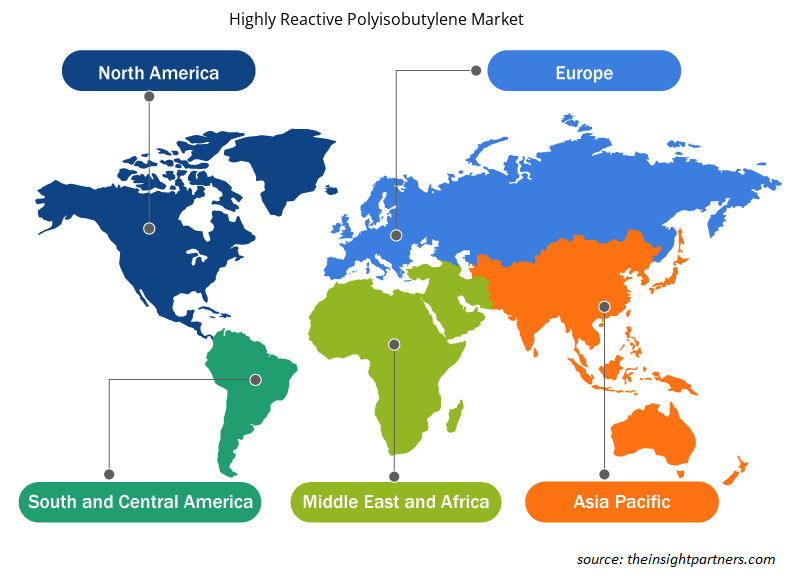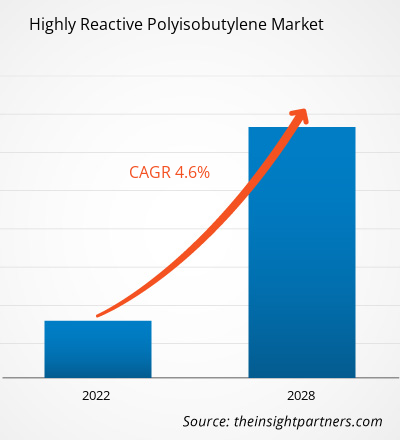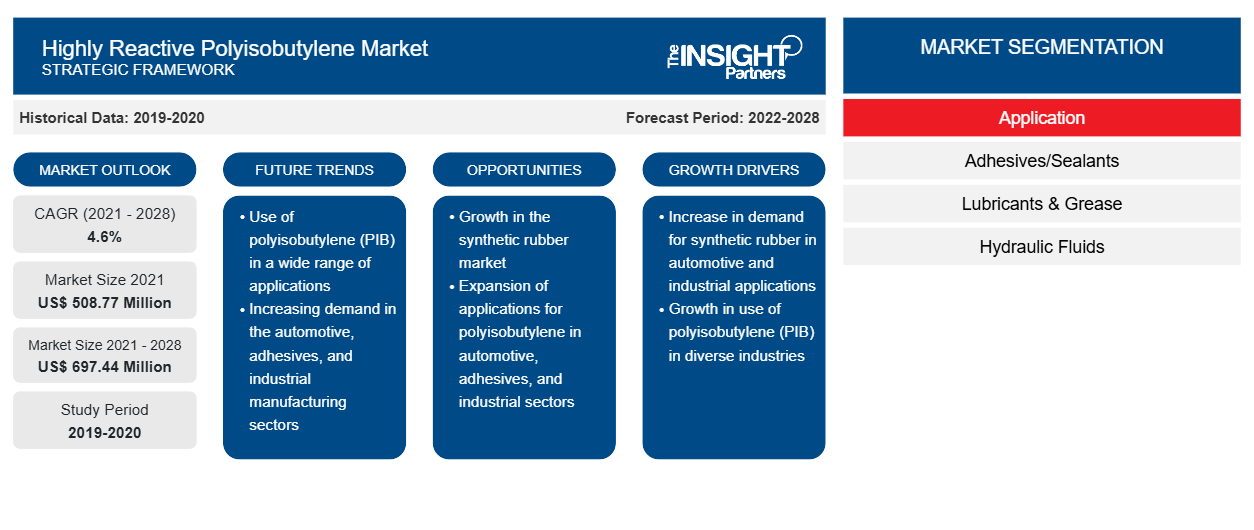Se proyecta que el mercado de poliisobutileno altamente reactivo alcance los 697,44 millones de dólares en 2028, desde los 508,77 millones de dólares en 2021; se espera que crezca a una CAGR del 4,6% entre 2021 y 2028.
El poliisobutileno altamente reactivo (HR-PIB) es un importante intermediario que se utiliza en la producción de aditivos para combustibles y lubricantes de alto rendimiento, como dispersantes para aceites de motor o detergentes para combustibles. Los aditivos para lubricantes de alto rendimiento permiten diseños de motores con un consumo de combustible más eficiente.
En 2020, Asia Pacífico tuvo la mayor participación en los ingresos del mercado de poliisobutileno altamente reactivo . El segmento de lubricantes y grasas es el mayor consumidor de HR-PIB en la región de Asia Pacífico. La proliferación del sector automotriz en la región está impulsando la demanda de fluidos hidráulicos y lubricantes, lo que impulsa la necesidad de HR-PIB. Además, el aumento de la industrialización y la construcción en Asia Pacífico está impulsando la demanda de maquinaria y equipos en las instalaciones de fabricación relacionadas.
Personalice este informe según sus necesidades
Obtendrá personalización en cualquier informe, sin cargo, incluidas partes de este informe o análisis a nivel de país, paquete de datos de Excel, así como también grandes ofertas y descuentos para empresas emergentes y universidades.
- Obtenga las principales tendencias clave del mercado de este informe.Esta muestra GRATUITA incluirá análisis de datos, desde tendencias del mercado hasta estimaciones y pronósticos.
Impacto de la pandemia de COVID-19 en el mercado de poliisobutileno altamente reactivo
En 2020, varias industrias tuvieron que reducir la velocidad de sus operaciones debido a las interrupciones en las cadenas de suministro causadas por el cierre de las fronteras nacionales e internacionales, lo que provocó una baja demanda de HR-PIB. La pandemia provocó perturbaciones en los procesos de fabricación debido a las restricciones impuestas por las autoridades gubernamentales en varios países sobre el número de personal en los lugares de trabajo y el transporte, lo que dificultó el desplazamiento de los empleados hacia y desde los lugares de trabajo. HR-PIB encuentra importantes aplicaciones en la fabricación de aditivos para combustibles y lubricantes de alto rendimiento. La disminución de la demanda de combustible de varias industrias obstaculizó el consumo de aditivos para combustibles, lo que finalmente obstaculizó las ventas de HR-PIB. Sin embargo, a medida que las economías comenzaron a reactivar sus operaciones en 2021, la demanda de HR-PIB también comenzó a aumentar gradualmente.
Perspectivas del mercado
Aumento del uso de HR-PIB en la producción de aditivos para combustibles y lubricantes de alto rendimiento
El HR-PIB es un intermedio importante que se utiliza en la producción de is an important intermediate that finds application in the production of high-performance fuel and aditivos para combustibles y lubricantes de alto rendimiento . Debido a su naturaleza altamente reactiva, se prefiere al poliisobutileno convencional en la producción de aditivos. La función principal de los aditivos para lubricantes es mejorar las propiedades del material base en diferentes condiciones de funcionamiento. Además, los aditivos para lubricantes de alto rendimiento respaldan diseños de motores más eficientes en el consumo de combustible. Los dispersantes son aditivos para lubricantes que ayudan a prevenir la formación de lodos, barnices y otros depósitos en superficies críticas. La demanda de HR-PIB está creciendo en la síntesis industrial de dispersantes para aceites de motor de automóviles. La presencia de fuertes bases de fabricación aditiva en EE. UU., Europa y Asia Pacífico los convierte en los principales consumidores de HR-PIB. Por lo tanto, el uso creciente de HR-PIB en la fabricación de aditivos para combustibles y lubricantes de alto rendimiento impulsa el crecimiento del mercado.polyisobutylene in the production of additives. The main function of lubricant additives is to improve the properties of the base stock under different operating conditions. Moreover, high-performance lubricant additives support more fuel-efficient engine designs. Dispersants are lubricant additives that help prevent sludge, varnish, and other deposit formation on critical surfaces. The demand for HR-PIB is growing in the industrial synthesis of dispersants for automotive engine oils. The presence of strong additive manufacturing bases in the US, Europe, and Asia Pacific makes them prime consumers of HR-PIB. Hence, the increasing use of HR-PIB in the manufacturing of high-performance fuel and lubricant additives boosts the market growth.
Información sobre aplicaciones
Según la aplicación, el mercado de poliisobutileno altamente reactivo se ha segmentado en adhesivos/selladores, lubricantes y grasas, fluidos hidráulicos, fluidos para trabajar metales y otros. El segmento de lubricantes y grasas tuvo la mayor participación de mercado en 2020. Los lubricantes como aceites de motor, aceites de transmisión, aceites para engranajes, grasas y aceites para compresores son muy consumidos en las industrias automotriz, aeronáutica, marina y de maquinaria. HR-PIB ayuda a mejorar el rendimiento general de los lubricantes.polyisobutylene market has been segmented into adhesives/sealants, lubricants & grease, hydraulic fluids, metal working fluids, and others. The lubricants & grease segment held the largest market share in 2020. Lubricants such as engine oils, transmission oils, gear oils, greases, and compressor oils are highly consumed in the automotive, aircraft, marine, and machinery industries. HR-PIB helps enhance the overall performance of lubricants.
TPC Group; RB PRODUCTS INC.; BASF PETRONAS Chemicals Sdn. Bhd; Shandong Hongrui New Material Technology Co., Ltd; Daelim Co., Ltd.; Chevron Corporation; The Lubrizol Corporation; KEMAT Polybutenes; Weifang Binhai Petro-chem Co., Ltd.; y Nelson Brothers Incorporated se encuentran entre los actores clave del mercado de poliisobutileno altamente reactivo. Los actores que operan en el mercado de poliisobutileno altamente reactivo están altamente enfocados en el desarrollo de productos innovadores y de alta calidad para satisfacer los requisitos del cliente. Group; RB PRODUCTS INC.; BASF PETRONAS Chemicals Sdn. Bhd; Shandong Hongrui New Material Technology Co., Ltd; Daelim Co., Ltd.; Chevron Corporation; The Lubrizol Corporation; KEMAT Polybutenes; Weifang Binhai Petro-chem Co., Ltd.; and Nelson Brothers Incorporated are among the key market players in the highly reactive polyisobutylene market. Players operating in the highly reactive polyisobutylene market are highly focused on the development of high-quality and innovative products to meet the customer’s requirements.
Perspectivas regionales del mercado de poliisobutileno altamente reactivoPolyisobutylene Market Regional Insights
Los analistas de Insight Partners explicaron en detalle las tendencias y los factores regionales que influyen en el mercado de poliisobutileno altamente reactivo durante el período de pronóstico. Esta sección también analiza los segmentos y la geografía del mercado de poliisobutileno altamente reactivo en América del Norte, Europa, Asia Pacífico, Oriente Medio y África, y América del Sur y Central.

- Obtenga datos regionales específicos para el mercado de poliisobutileno altamente reactivo
Alcance del informe de mercado de poliisobutileno altamente reactivo
| Atributo del informe | Detalles |
|---|---|
| Tamaño del mercado en 2021 | US$ 508,77 millones |
| Tamaño del mercado en 2028 | US$ 697,44 millones |
| CAGR global (2021-2028) | 4,6% |
| Datos históricos | 2019-2020 |
| Período de pronóstico | 2022-2028 |
| Segmentos cubiertos | Por aplicación
|
| Regiones y países cubiertos | América del norte
|
| Líderes del mercado y perfiles de empresas clave |
|
Densidad de los actores del mercado de poliisobutileno altamente reactivo: comprensión de su impacto en la dinámica empresarial
El mercado de poliisobutileno altamente reactivo está creciendo rápidamente, impulsado por la creciente demanda de los usuarios finales debido a factores como la evolución de las preferencias de los consumidores, los avances tecnológicos y una mayor conciencia de los beneficios del producto. A medida que aumenta la demanda, las empresas amplían sus ofertas, innovan para satisfacer las necesidades de los consumidores y aprovechan las tendencias emergentes, lo que impulsa aún más el crecimiento del mercado.
La densidad de actores del mercado se refiere a la distribución de las empresas o firmas que operan dentro de un mercado o industria en particular. Indica cuántos competidores (actores del mercado) están presentes en un espacio de mercado determinado en relación con su tamaño o valor total de mercado.
Las principales empresas que operan en el mercado de poliisobutileno altamente reactivo son:
- Grupo TPC
- PRODUCTOS RB INC.
- Productos químicos BASF PETRONAS Sdn. Bhd
- Shandong Hongrui Tecnología de nuevos materiales Co., Ltd.
- Compañía Daelim Co., Ltd.
Descargo de responsabilidad : Las empresas enumeradas anteriormente no están clasificadas en ningún orden particular.

- Obtenga una descripción general de los principales actores clave del mercado de poliisobutileno altamente reactivo
Informe Destacado
- Tendencias progresivas en la industria del poliisobutileno altamente reactivo para ayudar a los actores a desarrollar estrategias efectivas a largo plazo
- Estrategias de crecimiento empresarial adoptadas por las empresas para garantizar el crecimiento en los mercados desarrollados y en desarrollo
- Análisis cuantitativo del mercado de poliisobutileno altamente reactivo de 2019 a 2028
- Estimación de la demanda mundial de HR-PIB
- Análisis de las cinco fuerzas de Porter para ilustrar la eficacia de los compradores y proveedores que operan en la industria
- Avances recientes para comprender el escenario competitivo del mercado
- Tendencias y perspectivas del mercado y factores que impulsan y restringen el crecimiento del mercado de poliisobutileno altamente reactivo
- Asistencia en el proceso de toma de decisiones destacando las estrategias de mercado que sustentan el interés comercial.
- Tamaño del mercado de poliisobutileno altamente reactivo en varios nodos
- Descripción detallada y segmentación del mercado, y la dinámica de la industria HR-PIB
- Tamaño del mercado de poliisobutileno altamente reactivo en varias regiones con oportunidades de crecimiento prometedoras
Mercado de poliisobutileno altamente reactivo
Solicitud
- Adhesivos/selladores
- Lubricante y grasa
- Fluidos hidráulicos
- Fluidos para trabajar metales
- Otros
Perfiles de empresas
- Grupo TPC
- PRODUCTOS RB INC.
- Productos químicos BASF PETRONAS Sdn. Bhd
- Shandong Hongrui Tecnología de nuevos materiales Co., Ltd.
- Compañía Daelim Co., Ltd.
- Corporación Chevron
- La Corporación Lubrizol
- Polibutenos KEMAT
- Weifang Binhai Petro-chem Co., Ltd.
- Nelson Brothers Incorporated
- Análisis histórico (2 años), año base, pronóstico (7 años) con CAGR
- Análisis PEST y FODA
- Tamaño del mercado, valor/volumen: global, regional y nacional
- Industria y panorama competitivo
- Conjunto de datos de Excel
Informes recientes
Testimonios
Razón para comprar
- Toma de decisiones informada
- Comprensión de la dinámica del mercado
- Análisis competitivo
- Información sobre clientes
- Pronósticos del mercado
- Mitigación de riesgos
- Planificación estratégica
- Justificación de la inversión
- Identificación de mercados emergentes
- Mejora de las estrategias de marketing
- Impulso de la eficiencia operativa
- Alineación con las tendencias regulatorias





















 Obtenga una muestra gratuita para - Mercado de poliisobutileno altamente reactivo
Obtenga una muestra gratuita para - Mercado de poliisobutileno altamente reactivo